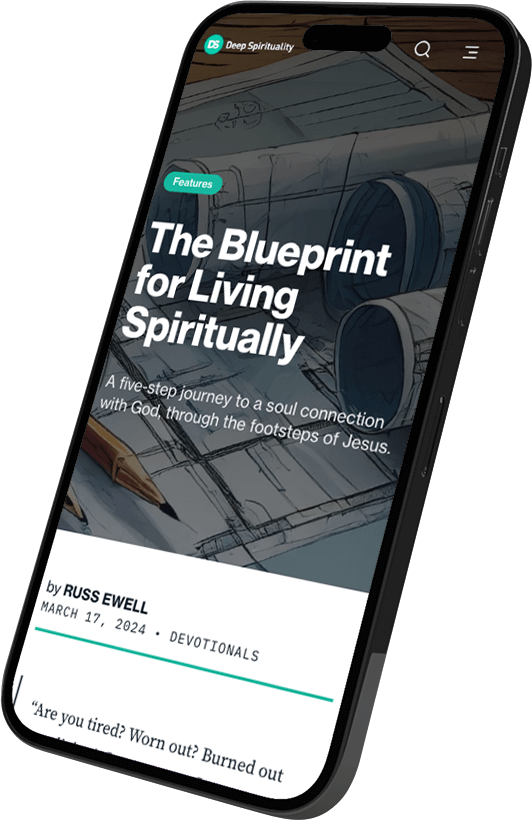Table of Contents
Contents
Key takeaways
- Recognizing and accepting our feelings is crucial for personal growth and emotional health. All emotions have value and contribute to our understanding of ourselves and our experiences, and help us get closer to God.
- It’s healthier to communicate our feelings appropriately rather than burying them, which can lead to stress and disconnection from others.
- While it’s essential to acknowledge and express our feelings, it’s equally important to maintain a balance. Focusing too much on negative emotions can be overwhelming, so it’s beneficial to also recognize and share positive experiences and emotions.
One day as Jesus was preaching on the shore of the Sea of Galilee, great crowds pressed in on him to listen to the word of God. He noticed two empty boats at the water’s edge, for the fishermen had left them and were washing their nets. Stepping into one of the boats, Jesus asked Simon, its owner, to push it out into the water.
So he sat in the boat and taught the crowds from there. When he had finished speaking, he said to Simon, “Now go out where it is deeper, and let down your nets to catch some fish.” “Master,” Simon replied, “we worked hard all last night and didn’t catch a thing. But if you say so, I’ll let the nets down again.” And this time their nets were so full of fish they began to tear! A shout for help brought their partners in the other boat, and soon both boats were filled with fish and on the verge of sinking.
When Simon Peter realized what had happened, he fell to his knees before Jesus and said, “Oh, Lord, please leave me-I’m such a sinful man.” For he was awestruck by the number of fish they had caught, as were the others with him. His partners, James and John, the sons of Zebedee, were also amazed. Jesus replied to Simon, “Don’t be afraid! From now on you’ll be fishing for people!” And as soon as they landed, they left everything and followed Jesus.
Luke 5:1-11 NLT
On this particular day, Jesus was busy.
He was surrounded by a large crowd, doing the most important job anyone could do—giving God’s Word to the people—but still, someone caught his eye. It wasn’t anyone in the crowd; it was a frustrated fisherman, outside of the crowd, his eyes downcast as he got ready to call it a day.
This fisherman, Simon, had been working hard all night and was coming up empty. Despite his best efforts, he was failing.
Sometimes we feel much like Simon in our spiritual lives. Despite our efforts to pray and read the Bible and attend church events, our relationship with God feels distant and unsatisfying. We don’t feel like our faith is producing the impact we want it to.
When we feel this way, we need to know two things:
- Jesus notices us. We are not too small or insignificant to him. Just as he noticed this frustrated and flailing fisherman, he notices our discouragement. He cares and wants to help us believe.
- Jesus answers our discouragement with six key words: “Go out where it is deeper.”
This is a key lesson from our book, He’s Not Who You Think He Is. In Chapter 6, “How God Becomes Satisfying,” we learn that we can’t be afraid of feeling our feelings:
Have you ever grown tired of feeling and simply shut down? When we grow weary of feeling, we don’t want anyone to make us feel—not even God. Like Peter, we resist and pull away whenever God tries to get close to us. We especially hate it when he makes
us aware of our sin because we already feel so terribly guilty. If we prefer being emotionally detached, the good news is that we are not alone. This was exactly Peter’s situation when he met Jesus. He told Jesus to go away because he felt too sinful to have a relationship with him.
Jesus told Peter two things: First, don’t be afraid. If we are emotionally detached, we must rely on God to help us overcome our fear of feeling. We have to trust that feeling our feelings will improve our relationship with God and people, and will also make our lives more satisfying and encouraging.
Russ Ewell, He’s Not Who You Think He Is (pp. 109-110)
I am very scared to go deep. My heart is full of confusing emotions, uncomfortable truths, sinful desires, and vulnerable needs that often feel overwhelming. I get afraid that feeling my feelings will lead to rejection from other people and pain I can’t handle. I fear that my feelings will overpower me and I will lose control.
As a result, I tend to push my feelings as far down as possible and focus my energy on behaving right as a Christian.
Unfortunately, this keeps my relationship with God superficial and stops me from experiencing his deep power in and through my life. I become like Simon Peter, working hard but coming back with an empty net.
I pray that he will use his glorious riches to make you strong. May his Holy Spirit give you his power deep down inside you.
Ephesians 3:16 NIrV
Our relationship with God should change us deep down inside, making us strong and powerful in ways we could never manage on our own. If we’re not experiencing that kind of walk with God, it may be because we fear our feelings; we have become emotionally detached from God.
In this devotional, I’m taking on my fear of feeling with promises from the Bible about going deep. When God is involved, our feelings don’t have to be scary or overpowering; feeling our feelings will lead to closeness, healing, strength, and purpose in our spiritual lives.
Let feelings lead to closeness with God
One of the biggest reasons I am afraid of feeling is I am afraid of rejection. I think I am only worthy of love if I am perfect, so I need to hide all my imperfections where no one can see them.
This is not how God thinks. He values honesty instead of perfection. He wants a close relationship, not a performance.
God’s word is alive and working. It is sharper than the sharpest sword and cuts all the way into us. It cuts deep to the place where the soul and the spirit are joined. God’s word cuts to the center of our joints and our bones. It judges the thoughts and feelings in our hearts. Nothing in all the world can be hidden from God. He can clearly see all things. Everything is open before him. And to him we must explain the way we have lived.
Hebrews 4:12-13 ERV
God loves going deep. His Word is deep; when we read it, it cuts all the way into us to reveal the thoughts and feelings in our hearts. This is what we mean by “going deeper”: revealing the thoughts and feelings inside of us that other people can’t see.
When we are honest with ourselves about our thoughts and feelings, God can speak to us on a deeper level. If we deny our feelings, we deny God access to our hearts. We stop him from encouraging us, influencing us, or changing how we feel.
I’ve spent much of my life pretending because I’m constantly afraid that the real me is not good enough or worthy of love. So I hide my true sins, weaknesses, failures, and desires. This passage encourages me that God wants closeness; he doesn’t want perfection.
The lyrics of a song by Andy Grammer help me understand God’s heart about going deep:
Show me where it hurts and give me something real
“The Good Parts” by Andy Grammer (2017)
And lead me to the part of you that never really heals
And say the words that burn when they leave your mouth
Tell me your story, but don’t leave the good parts out
And tell me all about your failures
The little things that make you cry
And tell me the acts that you preach but cannot seem to practice
That leave you compromised
I’ve seen your trophies, your highlight reels.
You know I would love you still if you lost it all.
And I love the castle that you have built,
But I am asking still to let down the walls.
The love of God is deeper than anything we can imagine, but we won’t experience it if we leave “the good parts” out of our relationship with him.
You have looked deep into my heart, LORD, and you know all about me. You know when I am resting or when I am working, and from heaven you discover my thoughts. You notice everything I do and everywhere I go. Before I even speak a word, you know what I will say, and with your powerful arm you protect me from every side.
Psalm 139:1-5 CEV
We can overcome our fear of going deeper with God when we realize that God already knows the deep parts of our hearts and he still sent Jesus on our behalf. He knows us better than we know ourselves, so we can feel secure about sharing our deepest thoughts with him.
What am I leaving out of my relationship with God?
When we feel detached, we sometimes need help identifying the things we don’t want to feel. The Bible gives us some insights into the things we will likely bury deep in our hearts, where others can’t see them. As uncomfortable or vulnerable as these things are to admit, our relationship with God will get closer and more satisfying when we are honest about them.
Warning: For those of us who tend to avoid our emotions, this list might feel overwhelming. We don’t have to look for each one of these feelings in our hearts all at once; instead, we can try picking one or two of the things in this list that resonate with us most.
1. Distress
One time, after they had finished their meal in the house of the LORD at Shiloh, Hannah got up. She was deeply distressed, and she cried bitterly as she prayed to the LORD.
1 Samuel 1:9-10 GNT
2. Doubts about God’s love
“Just look at this fellow! He didn’t depend on God for his safety. He put his trust in all his wealth. He grew strong by destroying others!” [8] But I am like a healthy olive tree. My roots are deep in the house of God. I trust in your faithful love for ever and ever.
Psalm 52:7-8 NIrV
3. Competitiveness, envy, and selfish ambition
My enemies cannot speak a truthful word. Their deepest desire is to destroy others. Their talk is foul, like the stench from an open grave. Their tongues are filled with flattery.
Psalm 5:9 NLT
4. Anger and bitterness
[14] The Spirit then lifted me up and took me away, and I went in bitterness and in the anger of my spirit, with the strong hand of the LORD on me. [15] I came to the exiles who lived at Tel Aviv near the Kebar River. And there, where they were living, I sat among them for seven days-deeply distressed. Ezekiel 3:14-15 NIV
5. Grief
Then He said to them, “My soul is deeply grieved, to the point of death; remain here and keep watch with Me.”
Matthew 26:38 NASB
6. Despair
So I am ready to give up; I am in deep despair. [5] I remember the days gone by; I think about all that you have done, I bring to mind all your deeds. [6] I lift up my hands to you in prayer; like dry ground my soul is thirsty for you. [7] Answer me now, LORD! I have lost all hope. Don’t hide yourself from me, or I will be among those who go down to the world of the dead. [8] Remind me each morning of your constant love, for I put my trust in you. My prayers go up to you; show me the way I should go.
Psalm 143:4-8 GNT
7. Guilt and shame
God, give me mercy from your fountain of forgiveness! I know your abundant love is enough to wash away my guilt. Because your compassion is so great, take away this shameful guilt of sin. Forgive the full extent of my rebellious ways, and erase this deep stain on my conscience.
Psalm 51:1-2 TPT
8. Temptations and desires
Whenever you feel tempted to do something bad, you should not say, “God is tempting me.” Evil cannot tempt God, and God himself does not tempt anyone. [14] You are tempted by the evil things you want. Your own desire leads you away and traps you. [15] Your desire grows inside you until it results in sin.
James 1:13-15 ERV
9. Pride
“We have heard all about Moab’s pride. We have heard how very proud they are. They think they are so much better than others. Their pride reaches deep down inside their hearts.
Jeremiah 48:29 NIrV
10. Our need for help
I have heard all about you, LORD. I am filled with awe by your amazing works. In this time of our deep need, help us again as you did in years gone by. And in your anger, remember your mercy.
Habakkuk 3:2 NLT
Pause and reflect
- Which of the feelings in the above list resonates with you most today? Why?
Let feelings lead to healing
Another fear I have about feeling is that the pain will be too difficult to face. If I bring things to the surface, I’m afraid of being left heartbroken.
Unfortunately, the things I bury never get the chance to heal. Instead, they sit in my heart and make me numb; they never truly heal.
For the hearts of these people are hardened, and their ears cannot hear, and they have closed their eyes- so their eyes cannot see, and their ears cannot hear, and their hearts cannot understand, and they cannot turn to me and let me heal them.’
Matthew 13:15 NLT
God wants us to dig deep because he wants to heal the parts of our hearts that have been hurt—by our own choices, by other people’s choices, or by painful circumstances. He promises not to leave us alone in this process; he will make us strong enough to open our hearts without drowning in our emotions.
When you go through deep waters, I will be with you. When you go through rivers of difficulty, you will not drown. When you walk through the fire of oppression, you will not be burned up; the flames will not consume you.
Isaiah 43:2 NLT
If we open up the deep waters of our hearts, God won’t leave us alone.
We can also find great comfort in knowing that Jesus experienced every kind of grief we experience as humans. That’s part of why he had to come to earth; we needed to know that God fully understands everything we experience.
He was despised and rejected- a man of sorrows, acquainted with deepest grief. We turned our backs on him and looked the other way. He was despised, and we did not care. [4] Yet it was our weaknesses he carried; it was our sorrows that weighed him down. And we thought his troubles were a punishment from God, a punishment for his own sins.
Isaiah 53:3-4 NLT
We don’t have to be afraid of facing painful feelings because Jesus has already gone ahead of us and faced every kind of pain there is. He cares about us enough to carry our sorrows, weaknesses, and pain. He won’t leave us alone; he will guide us through our feelings to find hope and healing.
Let feelings lead to internal strength
“This is the meaning of the parable: The seed is God’s word… [13] The seeds on the rocky soil represent those who hear the message and receive it with joy. But since they don’t have deep roots, they believe for a while, then they fall away when they face temptation.
Luke 8:11;13 NLT
“So why do you keep calling me ‘Lord, Lord!’ when you don’t do what I say? [47] I will show you what it’s like when someone comes to me, listens to my teaching, and then follows it. [48] It is like a person building a house who digs deep and lays the foundation on solid rock. When the floodwaters rise and break against that house, it stands firm because it is well built. [49] But anyone who hears and doesn’t obey is like a person who builds a house right on the ground, without a foundation. When the floods sweep down against that house, it will collapse into a heap of ruins.”
Luke 6:46-49 NLT
In both of the above parables, Jesus teaches that it’s important to dig deep if we want our faith to stand strong. Being shallow or superficial seems easier in the short term, but it leaves us weak.
For me, being superficial in my relationship with God means going through the motions but not letting God’s Word change my heart. I will eagerly serve at church, read the Bible with devotion, and even lead Bible studies with others. But I won’t let God influence my anxiety, fear of people’s opinions of me, or my motives for doing things. I can read the Bible, agree with it, and go on my way completely motivated by things like selfish ambition, jealousy, and bitterness (see James 1:20-21 for a great passage of the Bible on this).
It’s important to note that “feeling our feelings” does not mean “believing our feelings.” If we only feel and don’t plant Scripture deep in our hearts, we will be left in an emotional pit. But if we pray honestly about our feelings and then surrender them to God, trusting what he says in his Word instead of our emotions, we will become stronger.
Let feelings lead to purpose
But blessed are those who trust in the LORD and have made the LORD their hope and confidence. They are like trees planted along a riverbank, with roots that reach deep into the water. Such trees are not bothered by the heat or worried by long months of drought. Their leaves stay green, and they never stop producing fruit.
Jeremiah 17:7-8 NLT
Deep roots produce fruit. Many passages of the Bible use the imagery of fruit to describe the spiritual qualities, changed lives, and impactful purpose that come from being rooted in God (see John 15 and Galatians 5:22-23 for some examples). Using this analogy of a tree planted by a river, the above passage tells us that our lives produce fruit when we are deeply connected to God.
If there are feelings in our lives that we ignore or detach from, we won’t be able to help other people turn to God when they feel these same emotions. For example, if we haven’t taken our guilt to God to find forgiveness and confidence in our relationship with him, we will have difficulty giving someone else faith that God can forgive their sins.
Circling back to our first story about Simon the fisherman, we see how our deep feelings can lead to our purpose. Simon felt like a failure, too sinful and guilty to be near Jesus. Jesus helped him through this and focused him on his purpose of “fishing for people,” perhaps knowing that the world needed someone who understood guilt and failure. Every painful feeling is part of our purpose, and that’s why we don’t have to be afraid of feeling. We can give others the same comfort God gives us when we give him access to our hearts.
Blessed [gratefully praised and adored] be the God and Father of our Lord Jesus Christ, the Father of mercies and the God of all comfort, [4] who comforts and encourages us in every trouble so that we will be able to comfort and encourage those who are in any kind of trouble, with the comfort with which we ourselves are comforted by God.
2 Corinthians 1:3-4 AMP
Pause and reflect
- What fears do you have of feeling? Do you fear rejection, pain, or being out of control?
- Which promises of God help you confront your fear of feeling?
- Pick one deep part of your heart to talk to God about today. Find promises of God to believe about that topic that help you overcome your fears.
Explore more:
Amy is a writer and editor for Deep Spirituality. She studied psychology at the University of California, Berkeley, and has over a decade of experience in mentoring, counseling and community organizing.
Amy is a writer and editor for Deep Spirituality. She studied psychology at the University of California, Berkeley, and has over a decade of experience in mentoring, counseling and community organizing.






